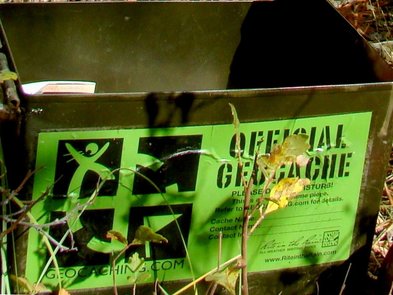
Geocaching
With the removal of selective availability of the Global Positioning System (GPS) in 2000, the new sport of geocaching came into existence. Similar in function to the old game of "Letterboxing", geocaching has quickly developed into a treasure-hunting game, using GPS equipment to locate containers hidden by other geocachers around the world. In the Panhandle region of Nebraska, with it's wealth of wilderness areas and trails, geocaching is also growing rapidly. GPS equipment is quickly becoming more sophisticated and attuned to the needs of geocachers. And, the prices continue to drop. Most major sporting good stores, like Cabela's or Scheel's, carry a full range of GPS equipment. And, many businesses sell GPS equipment online.
Even though the National Forest Service and state parks view placing geocache boxes as a "gray area", because of rules against leaving behind containers, such practices have been tolerated where there has been no abuse. Normally, a cache is some sort of small waterproof box, which contains a logbook and "treasures" placed by other geocachers who visit the site. The value of these "treasures" varies somewhat, depending on the association that uses the caches. Usually, though, they are small knickknacks, toys, or trinkets of low monetary value.
Each geocacher that uses the cache, signs the logbook, and exchanges a new "treasure" for one in the box. This information is then recorded online at a website. These websites contain the coordinates of caches for geocachers to try to find. There are variations of geocaching. One interesting variation is to use a public webcam as a geocaching site. Capturing one's image on the webcam becomes the verification, rather than a logbook.
Unfortunately, geocaches are occasionally vandalized or stolen. In such a case, they are sometimes said to have been "plundered" or "muggled". As geocachers have found out in several isolated incidents, law enforcement authorities have mistaken their activites, and been questioned for suspicious activities. In one case, they were suspected of planting bombs. So, some action has been taken to develop a set of accepted practices, known as the Geocacher's Creed and Geocaching Policy. This can be found by clicking here: GEOCREED
While geocaching.com is the original and largest geocaching website, there are other organizations and websites, as well. Listed below, are major geocaching websites with more detailed information for those interested in this fascinating new sport:
Geocaching Toolbox
About Geocaching
Project Geocaching
Geocaching Guide
www.geocaching.com
www.terracaching.com
www.NaviCache.com
With the removal of selective availability of the Global Positioning System (GPS) in 2000, the new sport of geocaching came into existence. Similar in function to the old game of "Letterboxing", geocaching has quickly developed into a treasure-hunting game, using GPS equipment to locate containers hidden by other geocachers around the world. In the Panhandle region of Nebraska, with it's wealth of wilderness areas and trails, geocaching is also growing rapidly. GPS equipment is quickly becoming more sophisticated and attuned to the needs of geocachers. And, the prices continue to drop. Most major sporting good stores, like Cabela's or Scheel's, carry a full range of GPS equipment. And, many businesses sell GPS equipment online.
Even though the National Forest Service and state parks view placing geocache boxes as a "gray area", because of rules against leaving behind containers, such practices have been tolerated where there has been no abuse. Normally, a cache is some sort of small waterproof box, which contains a logbook and "treasures" placed by other geocachers who visit the site. The value of these "treasures" varies somewhat, depending on the association that uses the caches. Usually, though, they are small knickknacks, toys, or trinkets of low monetary value.
Each geocacher that uses the cache, signs the logbook, and exchanges a new "treasure" for one in the box. This information is then recorded online at a website. These websites contain the coordinates of caches for geocachers to try to find. There are variations of geocaching. One interesting variation is to use a public webcam as a geocaching site. Capturing one's image on the webcam becomes the verification, rather than a logbook.
Unfortunately, geocaches are occasionally vandalized or stolen. In such a case, they are sometimes said to have been "plundered" or "muggled". As geocachers have found out in several isolated incidents, law enforcement authorities have mistaken their activites, and been questioned for suspicious activities. In one case, they were suspected of planting bombs. So, some action has been taken to develop a set of accepted practices, known as the Geocacher's Creed and Geocaching Policy. This can be found by clicking here: GEOCREED
While geocaching.com is the original and largest geocaching website, there are other organizations and websites, as well. Listed below, are major geocaching websites with more detailed information for those interested in this fascinating new sport:
Geocaching Toolbox
About Geocaching
Project Geocaching
Geocaching Guide
www.geocaching.com
www.terracaching.com
www.NaviCache.com

